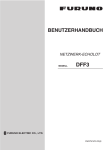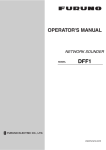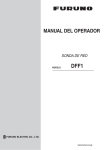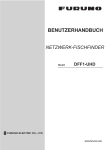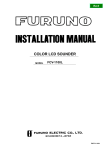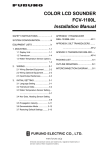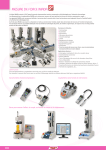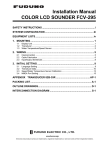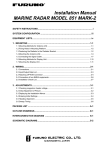Download Furuno DFF3 Radar Detector User Manual
Transcript
OPERATOR'S MANUAL NETWORK SOUNDER MODEL DFF3 www.furuno.co.jp IMPORTANT NOTICES • The descriptions in this manual are intended for readers with a solid knowledge of English. • No part of this manual may be copied or reproduced without written permission. • If this manual is lost or worn, contact your dealer about replacement. • The contents of this manual and equipment specifications are subject to change without notice. • Store this manual in a convenient place for future reference. • FURUNO will assume no responsibility for the damage caused by improper use or modification of the equipment (including software) by an unauthorized agent or a third party. • When it is time to discard this product it must be done according to local regulations for disposal of industrial waste. For disposal in the USA, refer to the Electronics Industries Alliance (http:// www.eiae.org/). i SAFETY INSTRUCTIONS The user and installer must read the appropriate safety instructions before attempting to install or operate the equipment. WARNING Indicates a potentially hazardous situation which, if not avoided, could result in death or serious injury. CAUTION Indicates a potentially hazardous situation which, if not avoided, may result in minor or moderate injury. Warning, Caution Prohibitive Action Mandatory Action Safety instructions for the operator WARNING WARNING Do not open the equipment. Do not operate the equipment with wet hands. Only qualified personnel should work inside the equipment. Electrical shock can result. Do not disassemble or modify the equipment. Do not place liquid-filled containers on the top of the equipment. Fire, electrical shock or serious injury can result. Electrical shock can result. Turn off the power immediately if the equipment is emitting smoke or fire. Do not install the equipment where it may be subjected to rain or water splash. Fire or electrical shock can result if the power is left on. Fire or electrical shock can result if water gets inside the equipment. Turn off the power immediately if water leaks into the equipment or an object is dropped inside the equipment. Use the proper fuse. WARNING Use of a wrong fuse can damage the equipment and may cause fire. Continued use can cause fire or electrical shock. A warning label is attached to the equipment. Do not remove this label. If the label is missing or illegible, contact a FURUNO agent or dealer about replacement. Turn off the power immediately if you feel the equipment is acting abnormally. If the equipment is hot to the touch or is emitting strange noises, turn off the power immediately and contact your dealer for advice. WARNING Name: Warning Label (1) To avoid electrical shock, Type: 86-003-1011-3 do not remove cover. No user-serviceable parts Code No.: 100-236-233-10 ii SAFETY INSTRUCTIONS Safety instructions for the installer WARNING CAUTION The transducer cable must be handled carefully, following the guidelines below. Do not open the equipment. Only qualified personnel should work inside the equipment. • Keep fuels and oils away from the cable. • Locate the cable away from chemicals. • Locate the cable away from locations where it might be damaged. Turn off the power before beginning the installation. Fire or electrical shock can result if the power is left on. Do not apply the power with the transducer exposed to air. Be sure no water leaks at the transducer and temperature sensor. Damage to the transducer may result. Water leakage can sink the vessel. Also, confirm that neither the transducer or sensor will loosen by vibration. The installer is solely responsible for the installation. WARNING Observe the following compass safe distances to prevent interference to a magnetic compass: Confirm that the power supply voltage is within the rating of this equipment. Incorrect voltage will damage the equipment and may cause fire. iii Standard compass Steering compass 0.95 m 0.60 m TABLE OF CONTENTS FOREWORD ....................................................................................................................v SYSTEM CONFIGURATION ..........................................................................................vi 1. MOUNTING ...............................................................................................................1 1.1 Equipment Lists............................................................................................................. 1 1.2 Network Sounder .......................................................................................................... 8 1.3 Transducer .................................................................................................................... 9 1.4 Optional Speed/Temperature Sensors ST-02MSB, ST-02PSB .................................... 9 1.4.1 Mounting considerations........................................................................................ 9 1.4.2 Mounting procedure............................................................................................... 9 1.5 Optional Temperature Sensors ................................................................................... 10 1.5.1 Transom mount temperature sensor T-02MTB ................................................... 10 1.5.2 Thru-hull temperature sensor T-02MSB, T-03MSB ............................................. 11 2. WIRING ...................................................................................................................12 2.1 Wiring Outline.............................................................................................................. 12 2.2 Transducer Cable........................................................................................................ 13 3. INITIAL SETTINGS .................................................................................................15 3.1 Tap Setting.................................................................................................................. 15 3.2 DIP Switch Setting ...................................................................................................... 16 3.3 Operation Check ......................................................................................................... 18 4. MAINTENANCE ......................................................................................................19 4.1 Maintenance................................................................................................................ 19 4.2 Replacing the Fuse ..................................................................................................... 20 4.3 Restoring Default Settings .......................................................................................... 20 iv FOREWORD A Word to the Owner of the DFF3 Congratulations on your choice of the FURUNO DFF3 Network Sounder. We are confident you will see why the FURUNO name has become synonymous with quality and reliability. For 60 years FURUNO Electric Company has enjoyed an enviable reputation for quality marine electronics equipment. This dedication to excellence is furthered by our extensive global network of agents and dealers. This equipment is designed and constructed to meet the rigorous demands of the marine environment. However, no machine can perform its intended function unless operated and maintained properly. Please carefully read and follow the recommended procedures for operation and maintenance. Thank you for considering and purchasing FURUNO. Features The DFF3 network sounder is a dual frequency echo sounder designed for use with the FURUNO NavNet/NavNet vx2/NavNet 3D series. The DFF3 feeds data about underwater conditions via a LAN. A few of the features are • FURUNO Free Synthesizer (FFS) transceiver design allows use of user-selectable operating frequencies (28 - 200 kHz). • Automatic operation selects correct range and gain to show fish echoes and bottom in both shallow and deep waters. • Improved discrimination of near-surface fish by eliminating the transmission line. • Heaving compensation* stabilizes the picture against ship’s pitching and rolling. * Requires NavNet 3D display device and Satellite Compass SC-30, heading data fed in NMEA 2000® format. • ACCU-FISH® feature estimates length and depth of individual fish. (Transducer 50/200-1T only for use with NavNet 3D.) • 1/2/3 kW output Note: The terms “NavNet” and “Navnet 3D” refer to the models listed below. Navnet/NavNet vx2 NavNet 3D Model 17x2 Series, Model 17x2C Series, Model 17x4 Series, Model 17x4C Series, GD-1720, GD-1720C, Model 18x3C(-BB) Series, Model 18x4C(-BB) Series, Model 19x3C(-BB) Series, Model 19x4C(-BB) Series, GD-1900C(-BB), GD-1920C(-BB) v MFDBB, MFD8, MFD12 SYSTEM CONFIGURATION Basic configuration shown with solid line. NavNet Series NavNet 3D Series HUB* * HUB-100 (For NavNet) HUB-101 (For NavNet 3D) Network Sounder DFF3 ST-BY DFF3 NETWORK SOUNDER 12-24 VDC Rectifier PR-62 Speed/Temperature Sensor ST-02MSB ST-02PSB 100/110/115/ 220/230 VAC 1φ, 50/60 Hz Temperature Sensor T-02MTB T-02MSB T-03MSB High Freq. Low Freq. Transducer Transducer vi 1. MOUNTING 1.1 Equipment Lists Standard supply Name Type Code No. Qty Remarks Network Sounder DFF3 — Spare Parts SP02-05601 001-033-740 1 set Fuse Installation Materials CP02-08500 000-011-917 1 set - Power cable (3.5 m) - LAN cable (5 m for NavNet 3D) - Self-tapping screws 1 Optional supply Name Transducer Thru-hull pipe Type 1/2/3kW available. See next page for choices. Tank Cable Assembly Code No. Remarks — — — MJ-A6SPF0017-010C 001-159-704-10 1 m, for NavNet MJ-A6SPF0017-050C 001-159-705-10 5 m, for NavNet MJ-A6SPF0017-100C 001-159-706-10 10 m, for NavNet MJ-A6SPF0017-200C 001-159-707-11 20 m, for NavNet MJ-A6SPF0017-300C 001-159-708-11 30 m, for NavNet MOD-Z072-020+ 000-167-175-10 2 m, for NavNet 3D (HUB-101) MOD-Z072-100+ 001-167-177-10 10 m, for NavNet 3D (HUB-101) Speed/Temperature Sensor ST-02MSB 000-137-986 Thru-hull mount, steel hull ST-02PSB 000-137-987 Thru-hull mount, plastic hull Temperature Sensor T-02MTB 000-040-026 Transom mount T-02MSB 000-040-040 Thru-hull mount T-03MSB 000-040-027 Thru-hull mount PR-62 000-013-484 100 VAC 000-013-485 110 VAC 000-013-486 220 VAC 000-013-487 230 VAC Rectifier 1 1. MOUNTING Transducer, thru-hull pipe and tank combinations Output (W) 1k/1k Frequency (kHz) 28/50 Ship type Steel TWB-6000(2) T-656 28F-8 88B-8 TWB-6000(2) T-657 50B-9B 88B-8 TWB-6000(2) T-658 - - Steel 50/200-1T or TFB-5000(1) T-603 FRP 50/200-1ST - T-603F Steel 50/200-12M - - - - Steel FRP 50/88 Steel FRP 50/200 FRP 1k/2k 28/200 Steel FRP 50/200 Steel FRP 88/200 Tank 28F-8 50B-9B FRP 28/88 Thru-hull pipe Transducer Steel FRP - - - - 28F-8 200B-8/8B TWB-6000(2) T-657 50B-9B 200B-8/8B TWB-6000(2) T-658 88B-8 200B-8/8B TWB-6000(2) T-659 2 - - - - - - 1. MOUNTING Output (W) 2k/2k Frequency (kHz) 28/50 Ship type Steel FRP 28/82 Steel FRP 28/88 Steel FRP 28/200 Steel FRP Steel FRP 38/200 Steel FRP 50/82 Steel FRP 50/88 Steel FRP 50/200 Steel FRP Steel FRP Steel FRP 82/200 Steel FRP 88/200 Steel FRP 28/107 Steel FRP Transducer Thru-hull pipe Tank 28F-18 50B-12 TFB-7000(2) T-634 TRB-1100(2) T-634-F 28F-18 82B-35R TFB-7000(2) T-636 TRB-1100(2) T-636-F 28F-18 88B-10 TFB-7000(2) T-636 TRB-1100(2) T-636-F 28F-18 200B-8/8B TFB-7000(2) T-638 TRB-1100(2) T-638-F 28BL-6HR 200B-8/8B TFB-7000(2) T-693 TRB-1100(2) T-693-F 38BL-9HR 200B-8/8B TFB-7000(2) T-693 TRB-1100(2) T-693-F 50B-12 82B-35R TFB-7000(2) T-643 TRB-1100(2) T-643-F 50B-12 88B-10 TFB-7000(2) T-643 TRB-1100(2) T-643-F 50B-12 200B-8/8B TFB-7000(2) T-645 TRB-1100(2) T-645-F 50BL-12HR 200B-8/8B TFB-7000(2) T-693 TRB-1100(2) T-693-F 50BL-12 200B-8/8B TFB-7000(2) T-693 TRB-1100(2) T-693-F 82B-35R 200B-8/8B TFB-7000(2) T-649 TRB-1100(2) T-649-F 88B-10 200B-8/8B TFB-7000(2) T-649 TRB-1100(2) T-649-F 28F-18 100B-10R TFB-7000(2) T-636 TRB-1100(2) T-636-F 3 1. MOUNTING Output (W) 2k/3k Frequency (kHz) 28/150 Ship type Steel FRP 50/107 Steel FRP 50/150 Steel FRP 3k/2k 68/200 Steel FRP 107/200 Steel FRP 3k/3k 28/38 Steel FRP Steel FRP 28/50 Steel FRP Steel FRP Steel FRP Steel FRP Steel FRP Transducer 28F-18 150B-12H 50B-12 100B-10R 50B-12 150B-12H 68F-30H 200B-8/8B 100B-10R 200B-8/8B 28BL-12HR 38BL-15HR 28F/24H 38BL-15HR 28BL-12HR 50BL-24HR 28BL-12HR 50F-24H 28F-24H 50BL-24H 28F-24H 50BL-24HR 28F-24H 50F-24H 4 Thru-hull pipe Tank TFB-7000(2) T-637 TRB-1100(2) T-637-F TFB-7000(2) T-643 TRB-1100(2) T-643-F TFB-7000(2) T-644 TRB-1100(2) T-644-F TFB-7000(2) T-647 TRB-1100(2) T-647-F TFB-7000(2) T-649 TRB-1100(2) T-649-F TFB-7000(2) T-681 TRB-1100(2) T-681-F TFB-7000(2) T-681 TRB-1100(2) T-681-F TFB-7000(2) T-681 TRB-1100(2) T-681-F TFB-7000(2) T-681 TRB-1100(2) T-681-F TFB-7000(2) T-696 TRB-1100(2) T-696-F TFB-7000(2) T-681 TRB-1100(2) T-681-F TFB-7000(2) T-681 TRB-1100(2) T-681-F 1. MOUNTING Output (W) 3k/3k (con’t) Frequency (kHz) 28/88 Ship type Steel FRP Steel FRP 28/150 Steel FRP Steel FRP 28/200 Steel FRP Steel FRP 38/50 Steel FRP Steel FRP 38/88 Steel FRP 38/150 Steel FRP 38/200 Steel FRP 50/88 Steel FRP Steel FRP Steel FRP 50/150 Steel FRP Steel FRP Transducer Thru-hull pipe Tank 28BL-12HR 88F-126H TFB-7000(2) T-682 TRB-1100(2) T-682-F 28F-24H 88F-126H TFB-7000(2) T-682 TRB-1100(2) T-682-F 28BL-12HR 150B-12H TFB-7000(2) T-683 TRB-1100(2) T-683-F 28F-24H 150B-12H TFB-7000(2) T-683 TRB-1100(2) T-683-F 28BL-12HR 200B-12H TFB-7000(2) T-683 TRB-1100(2) T-683-F 28F-24H 200B-12H TFB-7000(2) T-683 TRB-1100(2) T-683-F 38BL-15HR 50BL-24HR TFB-7000(2) T-681 TRB-1100(2) T-681-F 38BL-15HR 50F-24H TFB-7000(2) T-681 TRB-1100(2) T-681-F 38BL-15HR 88F-126H TFB-7000(2) T-682 TRB-1100(2) T-682-F 38BL-15HR 150B-12H TFB-7000(2) T-683 TRB-1100(2) T-683-F 38BL-15HR 200B-12H TFB-7000(2) T-683 TRB-1100(2) T-683-F 50BL-24H 88F-126H TFB-7000(2) T-697 TRB-1100(2) T-697-F 50BL-24HR 88F-126H TFB-7000(2) T-682 TRB-1100(2) T-682-F 50F-24H 88F-126H TFB-7000(2) T-682 TRB-1100(2) T-682-F 50BL-24HR 150B-12H TFB-7000(2) T-683 TRB-1100(2) T-683-F 50F-24H 150B-12H TFB-7000(2) T-683 TRB-1100(2) T-683-F 5 1. MOUNTING Output (W) 3k/3k (con’t) Frequency (kHz) 50/200 Ship type Steel FRP Steel FRP Steel FRP 68/150 Steel FRP 68/200 Steel FRP 88/150 Steel FRP 88/200 Steel FRP 1k 28 Steel Transducer 50BL-24H 200B-12H 50BL-24HR 200B-12H 50F-24H 200B-12H 68F-30H 150B-12H 68F-30H 200B-12H 88F-126H 150B-12H 88F-126H 200B-12H 28F-8 FRP 50 Steel 50B-6/6B FRP Steel 50B-9B FRP 68 Steel 68F-8H FRP 88 Steel 88B-8 FRP 200 Steel 200B-5S FRP 2k 28 Steel 28F-18 FRP Steel 28BL-6HR FRP 38 Steel 38BL-9HR FRP 6 Thru-hull pipe Tank TFB-7000(2) T-695 TRB-1100(2) T-695-F TFB-7000(2) T-683 TRB-1100(2) T-683-F TFB-7000(2) T-683 TRB-1100(2) T-683-F TFB-7000(2) T-646 TRB-1100(2) T-646-F TFB-7000(2) T-646 TRB-1100(2) T-646-F TFB-7000(2) T-685 TRB-1100(2) T-685-F TFB-7000(2) T-685 TRB-1100(2) T-685-F TFB-5000(1) T-604 TRB-1000(1) T-604-F TFB-5000(1) T-605 TRB-1000(1) T-605-F TFB-5000(1) T-603 TRB-1000(1) T-603-F TFB-5000(1) T-621 TRB-1000(1) T-621-F TFB-5000(1) T-606 TRB-1000(1) T-606-F TFB-5000(1) T-605 TRB-1000(1) T-605-F TFB-5000(1) T-612 TRB-1000(1) T-612-F TFB-5000(1) T-702 TRB-1000(1) T-702-F TFB-5000(1) T-702 TRB-1000(1) T-702-F 1. MOUNTING Output (W) 2k (con’t) Frequency (kHz) 50 Ship type Steel Transducer 50B-12 FRP Steel 50BL-12 FRP Steel 50BL-12HR FRP 82 Steel 82B-35R FRP 88 Steel 88B-10 FRP 200 Steel 200B-8/8B FRP 7 Thru-hull pipe Tank TFB-5000(1) T-611 TRB-1000(1) T-611-F TFB-5000(1) T-702 TRB-1000(1) T-702-F TFB-5000(1) T-702 TRB-1000(1) T-702-F TFB-5000(1) T-609 TRB-1000(1) T-609-F TFB-5000(1) T-609 TRB-1000(1) T-609-F TFB-5000(1) T-608 TRB-1000(1) T-608-F 1. MOUNTING Output (W) 3k Frequency (kHz) 28 Ship type Steel Transducer 28F-24H FRP Steel 28BL-12HR FRP 38 Steel 38BL-15HR FRP 50 Steel 50F-24H FRP Steel 50BL-24HR FRP Steel 50BL-24H FRP 68 Steel 68F-30H FRP 88 Steel 88F-126H FRP 107 Steel 100B-10R FRP 150 Steel 150B-12H FRP 200 Steel 200B-12H FRP 1.2 Thru-hull pipe Tank TFB-4000(1) T-616 TRB-1000(1) T-616-F TFB-4000(1) T-616 TRB-1000(1) T-616-F TRB-4000(1) T-616- TRB-1000(1) T-616-F TFB-4000(1) T-616 TRB-1000(1) T-616-F TFB-4000(1) T-616 TRB-1000(1) T-616-F TFB-4000(1) T-694 TRB-1000(1) T-694-F TFB-5000(1) T-614 TRB-1000(1) T-614-F TFB-4000(1) T-618 TRB-1000(1) T-618-F TFB-5000(1) T-609 TRB-1000(1) T-609-F TFB-5000(1) T-615 TRB-1000(1) T-615-F TFB-5000(1) T-615 TRB-1000(1) T-615-F Network Sounder The network sounder can be installed on a desktop, deck or on a bulkhead. When selecting a mounting location for the network sounder, keep the following in mind: • The temperature and humidity at the mounting site should be moderate and stable. • Locate the unit away from exhaust pipes and vents. • The mounting location should be well ventilated. • Mount the unit where shock and vibration are minimal. • Keep the unit away from electromagnetic field-generating equipment such as motors and generators. • Leave slack in cables for maintenance and servicing ease. 8 1. MOUNTING • A magnetic compass will be affected if the network sounder is placed too close to it. Observe the compass safe distances noted in the safety instructions to prevent disturbance to the magnetic compass. Fasten the network sounder to the mounting location with four self-tapping screws (5×20), referring to the outline drawing at the back of this manual for mounting dimensions. 1.3 Transducer The performance of the echo sounder largely depends upon the transducer position. Select a place least affected by air bubbles since turbulence blocks the sounding path. Further, select a place least influenced by engine noise. It is known that air bubbles are fewest at the place where the bow first falls and the next wave rises, at usual cruising speed. Note: The face of the transducer must be facing the sea bottom in normal cruising trim of the boat. 1.4 Optional Speed/Temperature Sensors ST-02MSB, ST-02PSB 1.4.1 Mounting considerations Select a suitable mounting location considering the following points: • Select a mid-boat flat position. The sensor does not have to be installed perfectly perpendicular. However, the sensor must not be damaged in dry-docking operation. • Select a place apart from equipment generating heat. • Select a place in the forward direction viewing from the drain hole, to allow for circulation of cooling water. • Select a place free from vibration. • Do not install near the transducer of an echo sounder, to prevent interference to the echo sounder. 1.4.2 Mounting procedure 1. Dry dock the boat. 2. Make a hole of approx. 51 mm in diameter in the mounting location. 3. Unfasten locknut and remove the sensor section. Locknut Face "notch" toward bow. 4. Apply high-grade sealant to the flange of the sensor. Flange nut 5. Pass the sensor casing through the hole. 51 6. Face the notch on the sensor toward boat's bow and tighten the flange. 7. Set the sensor section to the sensor casing and tighten the locknut. 8. Launch the boat and check for water leakage around the sensor. 9 Coat with silicone sealant. Brim φ77 123 1. MOUNTING 1.5 Optional Temperature Sensors 1.5.1 Transom mount temperature sensor T-02MTB • Fix the cable at a convenient location with cable clamp. • When the cable is led in through the transom board, make a hole of approx. 17 mm in diameter to pass the connector. After passing the cable, fill the hole with a sealing compound. D>50cm D 5x20 Mount sensor flush with hull bottom. 10 1. MOUNTING 1.5.2 Thru-hull temperature sensor T-02MSB, T-03MSB Select a suitable mounting location considering the following points: • Select a mid-boat flat position. The sensor does not have to be installed perfectly perpendicular. However, the location should not be such that the transducer may be damaged when the boat is dry-docked. • Locate away from equipment which gives off heat. • Locate away from drain pipes. • Select a location where vibration is minimal. T-02MSB T-03MSB Sensor Holder cable 8m Sensor cable 8m Locknut Locknut Washer Gasket Locknut Washer φ21 mm φ42 mm Mounting procedure 1. Drill a hole of 21 mm in diameter in the mounting location. 2. Pass the sensor cable through the hole. 3. Pass gasket, washer and locknut onto cable in that order. 4. Coat the sensor flange with high quality sealant and then fasten the sensor with the locknut. (Torque: max. 59N·m) 5. Launch the boat to check for water leakage around the sensor. M24 70 mm 70 mm M20 Coat with sealant. Gasket φ25 mm Coat with sealant. Plate thickφ50 mm ness within Holder Guide 25 mm Mounting procedure 1. Drill a hole of 25 mm in diameter in the mounting location. 2. Coat holder guide with high quality sealant, and pass gasket, washer and locknut onto holder guide in that order and then tighten the locknut. 3. Set the sensor holder to the holder guide from inside the boat and then tighten the locknut. 4. Launch the boat to check for water leakage around the sensor. 11 2. WIRING 2.1 Wiring Outline Connect the power cable, transducer cables, sensor cable, network cable and ground wire to their respective locations on the network sounder. See the next page for how to connect the transducer cables. NavNet or HUB-100 MJ-A6SPF0017 cable (1/5/10/20/30 m) NavNet 3D or HUB-101 MOD-Z072 Cable - Standard: 5 m - Option: 2 m, 10 m DFF3 H TRANSDUCER L 12-24VDC 2.8-1.4A TEMP MJ-A3SPF0013-035C (3.5 m) NETWORK Ground wire (IV-2 sq) GROUND Temperature or Speed/Temperature Sensor White Black High Freq. Low Freq. Shield (green) Transducer Transducer BATTERY 12 - 24 VDC Ground Connect a ground wire (IV-2 sq, local supply) between the ground terminal and ship’s ground to prevent interference to the sounder picture. Make the length of the wire as short as possible. For FRP vessels, install a ground plate that measures about 20 cm by 30 cm on the outside of the hull bottom and connect the ground wire there. 12 CAUTION Ground the equipment to prevent mutual interference. 2. WIRING 2.2 Transducer Cable TD-ID transducer (Airmar make transducer) The TD-ID type transducer can be connected to this equipment. However, note the following limitations: • TD-ID transducer cannot be used with NavNet, NavNet vx2. • TD-ID transducer cannot be used with non-TD-ID transducer. • Connect single TD-ID transducer to low frequency WAGO connector, regardless of actual frequency. Cable fabrication Fabricate the transducer cable as shown below. Separate the transducer cable well away from other electric cables to prevent interference to the sounder. This is especially important in the case of power cables from televisions and monitors. Approx. 100 Braided shield Sheath Extract cores from here and cut inner materials. Vinyl tape 6 20 Draw out braided shield and wrap it around sheath. Clamp this part with cable clamp. Cable connection After fabricating the transducer cable, connect the transducer cables to the equipment with WAGO connectors. 1. Open the cover: Grasp the cover at two sides, spread cover slightly and lift. 2. Unfasten six screws to remove the shield cover. 3. Detach the two WAGO connectors (low and high frequency) inside the equipment. Opener for WAGO connector is here. WAGO connector WAGO connector (High frequency) (Low frequency) 13 2. WIRING 4. Connect the transducer cable to the WAGO connector, following the instructions in the figure below and the interconnection diagram. (The opener for the WAGO connector is attached inside the equipment. See the figure above.) Push Opener (attached inside the equipment) 1. Twist conductors. 2. Insert opener as directed and press it down. 3. Insert core to hole. 4. Release opener. 5. Pull the core to make sure it is correctly inserted. Twist. Core 5. Unfasten the two screws labeled Screw A in the figure below. 6. Loosen the two screws labeled Screw B and slide cable clamp upward. Cable clamp Screw B Clamping plate Screw A 7. Pass the transducer cables through the cable entrance and connect their WAGO connectors to respective terminals inside the equipment. 8. Slide the cable clamp downward and tighten screws B and A in that order to fasten the cable clamp. Transducer cable 14 3. INITIAL SETTINGS WARNING Do not open the equipment unless totally familiar with electrical circuits. Only qualified personnel should work inside the equipment. 3.1 Tap Setting This equipment is preprogrammed for use with certain transducers. A jumper wire inside the equipment is set according to transducer model. Check the jumper wire setting instructions on the sticker attached to the chassis. Use the opener attached inside the unit to set the jumper wire. One end of the jumper wire is connected to COMMON; connect the other end to A - E in the jumper block as applicable. For transducers not programmed, for example, Airmar make TD-ID transducer, consult a FURUNO agent or dealer for advice. Tap setting plug Tap setting plug (High freq.) (Low freq.) Tap Setting LED EDCBA EDCBA High Freq. Low Freq. Common E D C BA Jumper wire Set in appropriate slot according to sticker. Note 1: For NavNet, the tap settings shown on the NETWORK SOUNDER SETUP are different from actual ones. Therefore, follow the instructions on the sticker inside the equipment. Note 2: For transducers 50/200-1ST, 50/200-1T and 50/200-12M, use the tap settings for 50/2001T (50: Tap B, 200: Tap C). 15 3. INITIAL SETTINGS 3.2 DIP Switch Setting The DIP switch S2 sets up the system according to the equipment connected. In the default setting all switches (1-8) are OFF. The DIP switch S3 should not be adjusted; leave all switches in the OFF position. 1-8 S2 ON OFF 1-8 S3 ON OFF DIP Switches DIP switch S2 description Switch No. Function Setting 1 Power on/off by NavNet or NavNet 3D OFF: Power sync (for NavNet 3D)*1 ON: No power sync (for NavNet) 2 Automatic/Manual IP address selection OFF: Automatic IP address assignment. Use this setting for NavNet 3D. ON: Manual IP address assignment. Use this setting for NavNet, and refer to the table on the next page for IP addresses. 3-6 Manual IP address assignment Valid when switch no. 2 is ON. For connection of multiple network sounders, assign each one an IP address with the Mode DIP switch, referring to the table on the next page. 7 Restore default settings (other than LAN and transducer) See section 4.3. 8 Restore ALL default settings See section 4.3. *1: Power sync setting enabled at NavNet 3D. 16 3. INITIAL SETTINGS DIP SW S2 setting, sounder and IP address SW No.3 SW No.4 SW No.5 SW No.6 Host Name IP Address OFF OFF OFF OFF SOUNDER 172.031.092.001 ON OFF OFF OFF SOUNDER1 172.031.092.011 OFF ON OFF OFF SOUNDER2 172.031.092.012 ON ON OFF OFF SOUNDER3 172.031.092.013 OFF OFF ON OFF SOUNDER4 172.031.092.014 ON OFF ON OFF SOUNDER5 172.031.092.015 OFF ON ON OFF SOUNDER6 172.031.092.016 ON ON ON OFF SOUNDER7 172.031.092.017 OFF OFF OFF ON SOUNDER8 172.031.092.018 ON OFF OFF ON SOUNDER9 172.031.092.019 OFF ON OFF ON ON ON OFF ON OFF OFF ON ON ON OFF ON ON OFF ON ON ON ON ON ON ON Transducer setting at NavNet/NavNet3D After setting up the transducer at the DFF3, set transducer type at NavNet, NavNet 3D. See respective Installation Manual for the procedure. 17 3. INITIAL SETTINGS 3.3 Operation Check For NavNet, the DFF3 is powered on/off from ship’s switchboard. For NavNet 3D, it is powered on/off from the display unit. The LED on the cover of the DFF3 lights or blinks according to equipment state, as described in the table below. LED state and meaning LED state Meaning Lighting continuously • Standby state. (If, for NavNet, NavNet 3D no signal is received via LAN for more than 10 minutes, the equipment automatically goes into standby to lessen power consumption.) • Power on (20 seconds during initialization) • IP address not set Blinking every two seconds Normal operation Blinking every 0.4 seconds Transducer settings at NavNet, NavNet 3D not properly set. LED 18 4. MAINTENANCE NOTICE WARNING Do not apply paint, anti-corrosive sealant or contact spray to coating or plastic parts of the equipment. ELECTRICAL SHOCK HAZARD Do not open the equipment. Only qualified personnel should work inside the equipment. 4.1 Those items contain organic solvents that can damage coating and plastic parts, especially plastic connectors. Maintenance Regular maintenance is essential for good performance. Check the items listed in the table below at the suggested interval to help keep your equipment in good shape for years to come. Item Check point, action Check interval Transducer cables Check that cables are tightly fastened and are not Once a month damaged. Refasten if necessary. Replace if damaged. Power cable, sensor cable Check that these cables are tightly fastened and not damaged. Refasten if necessary. Replace if damaged. Once a month Ground Check for corrosion. Clean if necessary. Once a month Power supply voltage Check voltage. If out of rating correct problem. Once a month Cleaning the network sounder’s cabinet Dust or dirt on the cabinet may be removed with a dry cloth. Do not use chemical-based cleaners to clean the cabinet; they can remove markings and damage the cabinet. Once a month Transducer Marine life on the transducer face will result in a gradual decrease in sensitivity. Check the transducer face for cleanliness each time the boat is dry-docked. Carefully remove any marine life with a piece of wood or fine-grade sandpaper. When vessel is dry-docked 19 4. MAINTENANCE 4.2 Replacing the Fuse The 5A fuse (Type: FGBO-A 125V 5A PBF, Code No. 000-155-853-10) in the snap-in fuse holder on the power cable protects the equipment from equipment fault and reverse polarity of the ship's mains. If the equipment cannot be powered, the fuse may have blown. Find out the cause for blown fuse before replacing it. If the fuse blows again after replacement, contact a FURUNO agent or dealer for advice. WARNING Use the proper fuse. Use of a wrong fuse can damage the equipment and cause fire. 4.3 Restoring Default Settings This procedure restores all default sounder settings on the NavNet, NavNet 3D. You can restore all default settings or restore those other than transducer and LAN. This procedure should only be performed by a suitably qualified FURUNO technician. 1. Disconnect the power and LAN cables from the DFF3. 2. Turn on the #1 and #2 switches of the Mode switch. See section 3.2 for the location. 3. Turn on the #7 or #8 switch of the Mode switch as applicable. #7: Restore default settings other than LAN and transducer. #8: Restore all default settings. Use this when changing transducers. 4. Connect the power cable to the DFF3, and turn on the power at the ship’s switchboard. 5. The LED blinks (every four seconds) when default settings are completely restored. 20 PACKING LIST 02GF-X-9851 -0 A-1 DFF3-J/E N A M E ユニット 1/1 O U T L I N E DESCRIPTION/CODE № Q'TY UNIT ネットワーク魚探 1 DFF3 NETWORK SOUNDER 000-011-916-00 予備品 SPARE PARTS SP02-05601 ヒューズ 2 FGB0-A 125V 5A PBF FUSE GLASS TUBE TYPE 000-155-853-10 工事材料 INSTALLATION MATERIALS CP02-08500 +トラスタッピンネジ 1シュ 4 5X20 SUS304 SELF-TAPPING SCREW 000-162-608-10 ケーブル(組品)LAN 1 MOD-Z072-050+ CABLE ASSY. 000-167-176-10 ケーブル組品MJ 1 MJ-A3SPF0013-035C(5A) CABLE ASSY. 000-157-939-10 図書 DOCUMENT 取扱説明書 OPERATOR'S MANUAL 1 OM*-20370-* 000-168-581-1* ** コ-ド番号末尾の[**]は、選択品の代表コードを表します。 CODE NUMBER ENDING WITH "**" INDICATES THE CODE NUMBER OF REPRESENTATIVE MATERIAL. 型式/コード番号が2段の場合、下段より上段に代わる過渡期品であり、どちらかが入っています。 なお、品質は変わりません。 TWO TYPES AND CODES MAY BE LISTED FOR AN ITEM. THE LOWER PRODUCT MAY BE SHIPPED IN PLACE OF THE UPPER PRODUCT. QUALITY IS THE SAME. (略図の寸法は、参考値です。 DIMENSIONS IN DRAWING FOR REFERENCE ONLY.) C2037-Z01-A FURUNO DFF3 SPECIFICATIONS OF NETWORK SOUNDER DFF3 1 GENERAL 1.1 TX frequency 28-200 kHz, two frequencies alternately transmitted (selectable) 1.2 Output power 1/2/3 kW nominal 1.3 Amplifier type Wide dynamic range linear amplifier (double superheterodyne) 1.4 Depth range and Pulse repetition rate (PRR) Range (m) 2 5 10 40 100 200 400 1200 2 200 kHz, TX rate: 20 PRR ( /min.) 2403 (max) 2403 1621 476 222 117 58 34 INTERFACE 2.1 Number of port LAN: 1 port, Transducer: 2 port, Temp/speed sensor: 1 port 2.2 Network Ethernet 10BASE-T/100BASE-TX 3 POWER SUPPLY 3.1 Network sounder 3.2 Rectifier (PR-62, option) 100/110/220/230 VAC, 1 phase, 50/60 Hz 4 12-24 VDC: 2.8-1.4 A ENVIRONMENTAL CONDITION 4.1 Ambient temperature -15°C to +55°C 4.2 Relative humidity 93% at 40°C 4.3 Degree of protection IP20 4.4 Vibration requirement IEC 60945 5 COATING COLOR N2.5 (not changed) SP - 1 E2037S01A 080318 D-1 Jan.18'08 R.Esumi C B NOTE *1: SHIPYARD SUPPLY. *2: OPTION. 1 2 3 *1 IV-2sq. 整流器 RECTIFIER PR-62 *2 5 6 DPYC-1.5 *1 注記 *1)造船所手配。 *2)オプション。 100/110/ 220/230VAC 1φ,50/60Hz (-) GND *1 IV-2sq. ST-02MSB/PSB T-02MTB/MSB T-03MSB 水温・船速 センサー TEMP/SPEED SENSOR 8m MJ-A6SPF 1 2 3 4 5 6 1B2 02P6359 1B3 02P6360 J2 SHIELD TEMP TEMP_0V SPEED 12V_P GND RED DWG.No. SCALE J23(PH4P) KPO GND KPI GND J24(XH3P) NET_KP1_IO GND SHIELD J25(XH3P) NET_KP2_IO GND SHIELD T.TAKENO C2037-C01- A MASS 1 2 3 4 5 6 7 8 kg RJ45 P NET KP KP IN *2 RJ45 02-161-1001-0 NAME 名 称 TITLE *2 MJ-A6SPF0017-050C 5m,φ6 (MAX.30m) MJ-A6SPF MOD-Z072-050+,5m(2/10m *2) KP OUT P P P 50/200-1T/1ST 50/200-12M REF.No. 送受波器 TRANSDUCER T.YAMASAKI HF 1 2 3 1 2 3 1 2 3 4 1B1 02P6358 J19 TXP TXN RXP P_SW-P P_SW-N RXN NC NC 26/Mar/08 R.Esumi Feb. 26 '08 CHECKED Feb. 27 '08 APPROVED DRAWN LF 8/10/15m,φ12 A BLK 12-24VDC (+) MJ-A3SPF J1 WHT 1 (+) BLK 2 (-) GRN 3 SHIELD RED 8/10/15m,φ12 MJ-A3SPF0013-035C,3.5m 5A シロ クロ ミドリ BLK 1 2 3 4 5 6 7 J6(231-337/001-000) TD_LF-H GND TD_LF-L NC TDID_XDR-HL XDR-HL_GND TEMP_XDR-HL J7(231-337/001-000) TD_HF-H GND TD_HF-L NC TDID_XDR-H XDR-H_GND TEMP_XDR-H (+) (-) GND ネットワーク魚探 NETWORK SOUNDER DFF3 アカ RED 15m(1ST) 10m(1T/12M) 1 2 3 4 5 6 7 3 クロ BLK 2 アオ BLU J6 1 TD_LF-H 2 GND 3 TD_LF-L J7 1 TD_HF-H 2 GND 3 TD_HF-L ミドリ GRN 1 1 2 3 4 5 6 1 2 3 4 5 6 7 8 INTERCONNECTION DIAGRAM NETWORK SOUNDER 相互結線図 DFF3 ネットワーク魚探 指示部 DISPLAY UNIT (NAVNET 1/VX2) または OR マルチファンクションディスプレイ MULTI-FUNCTION DISPLAY MFD8/12 *2 イーサネットハブ ETHERNET HUB HUB-101 *2 E_TD-P E_TD-N E_RD-P E_RD-N NC SHIELD TXP TXN RXP NC NC RXN NC NC 4 S-1 The paper used in this manual is elemental chlorine free. ・FURUNO Authorized Distributor/Dealer 9-52 Ashihara-cho, Nishinomiya, 662-8580, JAPAN Telephone : +81-(0)798-65-2111 Fax : +81-(0)798-65-4200 All rights reserved. Printed in Japan A : MAR . 2008 Pub. No. OME-20370-A (DAMI ) DFF3 *00016858210* *00016858210* * 0 0 0 1 6 8 5 8 2 1 0 *
































